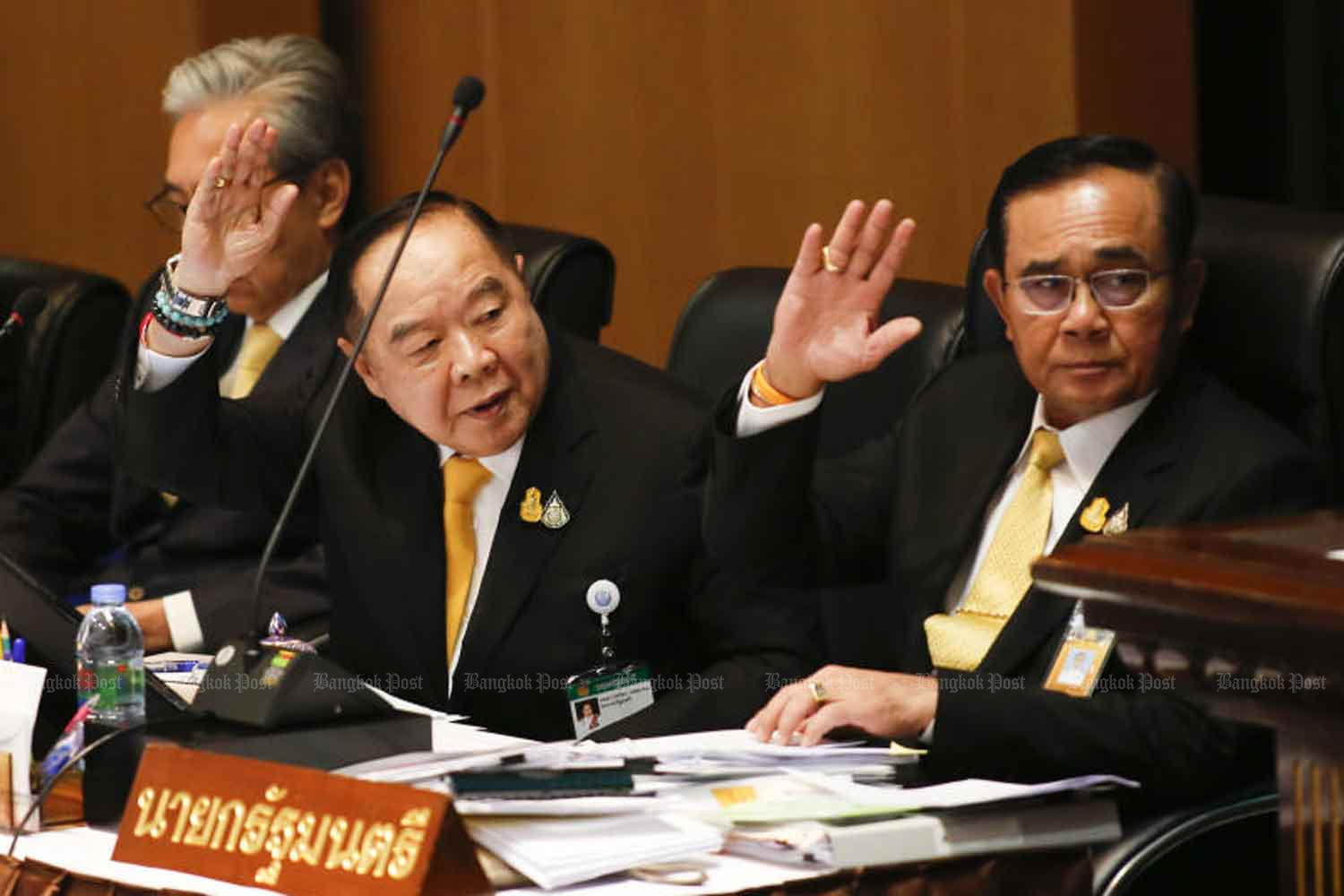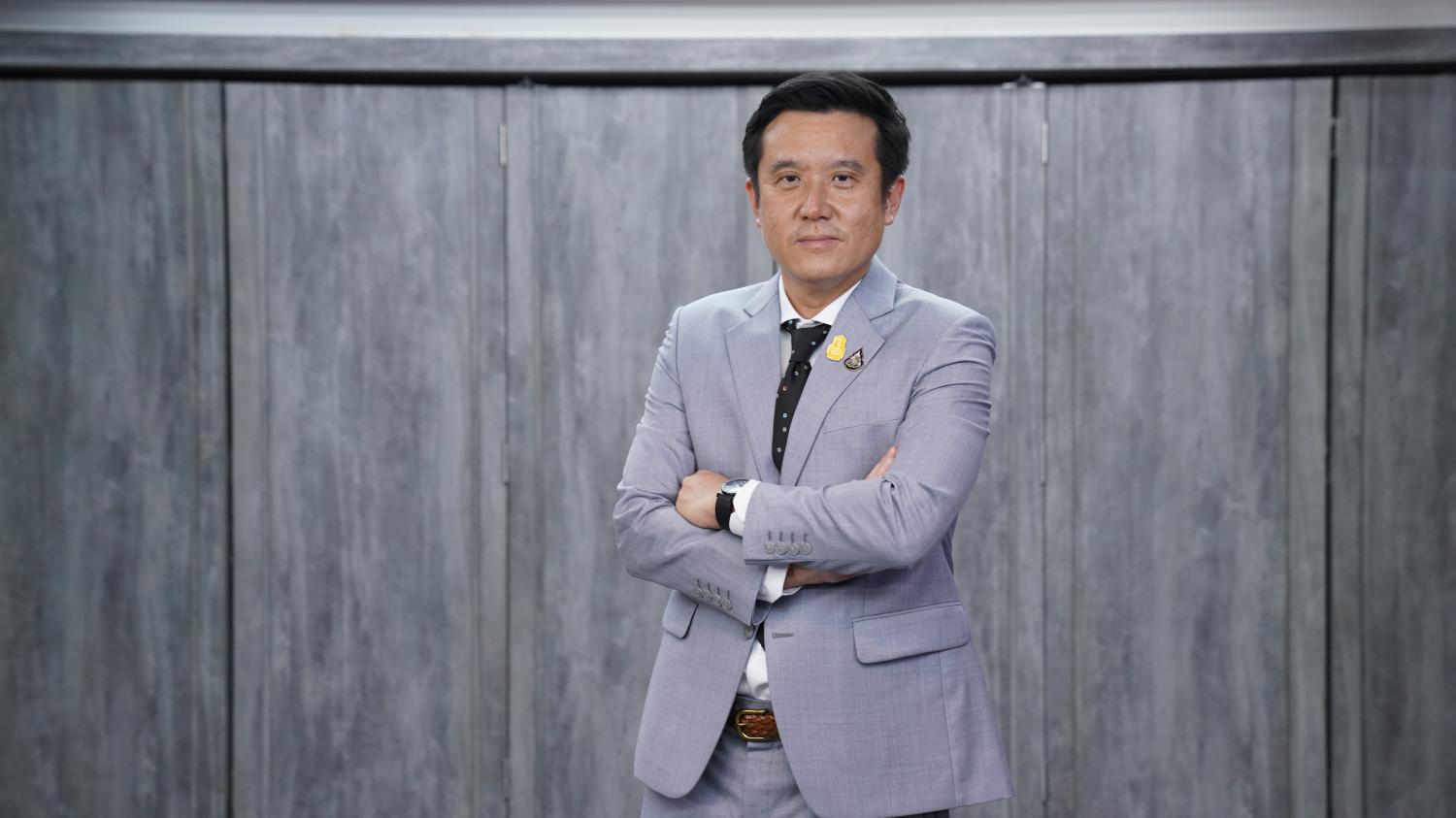
As the general election looms this year, the country is likely to find itself in a familiar situation where the coalition government and the Pheu Thai Party will battle it out to form a government.
Shortly after initial results of the 2019 polls were released, the Pheu Thai-led bloc of seven parties announced it had secured 255 seats to form a coalition government.
But its hope faded when Election Commission (EC) endorsed party-list MPs, which effectively reduced the number of seats garnered by the Pheu Thai-led alliance to 245.

Chaiwut: Sticking with Prawit
The Palang Pracharath Party (PPRP) rushed to form a rival coalition and won the ticket to Government House as soon as Gen Prayut Chan-o-cha was elected as prime minister. Pheu Thai, which won the most constituency seats in the previous polls, is widely speculated to win big, possibly raking in between 230-250 MP seats of the 500 up for grabs, in the upcoming contest which will take place on May 7 provided there is no House dissolution.
However, with the military-appointed senators who are allowed to join the MPs in the prime minister vote still a thorn in the Pheu Thai-led bloc's side, political analysts reckon that both camps will jostle hard again to get the upper hand in forming a coalition government.

Stithorn: 'Brothers' to compete
Political deja vu?
Political experts agree that who wins the prime minister nomination wins the battle to set up a government. As such, the required number of votes a bloc must win is not 251, but 376 -- the majority of MP and senator votes.
Stithorn Thananithichote, director of research and development at King Prajadhipok's Institute, said whether the current coalition can return to power will depend on the number of House seats the PPRP and the United Thai Nation (UTN) capture.
The UTN, founded in March 2021 by Seksakol Atthawong and now led by former Democrat Pirapan Salirathavibhaga, sprang onto the scene amid scepticism about its chances. But it has gone from a small party to a potential medium-sized party overnight after Gen Prayut confirmed his decision to join the party and become its prime ministerial candidate.
Prior to Gen Prayut's decision there were doubts whether the UTN can muster as many as 25 seats -- the minimum number that allows a party to nominate a prime ministerial candidate. Now the party is speculated to win at least 40 MPs in the next election.
PPRP, led by Gen Prawit Wongsuwon, and UTN must first win a combined 120 seats at least, which is the number the PPRP won in the 2019 general election, before they bring in other coalition partners to set up a government, said Mr Stithorn. Bhumjaithai led by Anutin Charnvirakul is expected to win about 100 seats while the Democrat Party under helm of Jurin Laksanawisit is predicted to fare poorly and may be lucky to retain 52 seats it won in the last elections, he said.
Still, the PPRP-UTN alliance can expect to team up with the Chartthaipattana Party and other smaller parties to get 250 seats in the House, he said. With 250 votes from the Senate, the alliance can get its candidate elected as prime minister and proceed to form a coalition.
This formula, however, does not guarantee that Gen Prayut will return as prime minister, according to Mr Stithorn. It depends on which party, between the PPRP and the UTN, gets more seats. If Gen Prayut, described by the academic as "the only choice of the conservative camp" has as many as 60 seats, he has a good chance of being re-elected.
With anything less than that, Gen Prayut will lack legitimacy and Gen Prawit's supporters are unlikely to let the post slip away, he said, stressing the two so-called brothers have chosen their own separate ways. In a scenario that the PPRP-UTN bloc cannot really muster 250 seats, it can use the service of "cobras", or renegade politicians in the Pheu Thai Party. Many are likely to cross floor if their own party fails to win 376 votes in the prime minister vote.

Yuttaporn: Prayut's chances better
PPRP-Pheu Thai coalition
Mr Stithorn did not rule out a possible alliance between PPRP and Pheu Thai and believed both parties will negotiate power-sharing with the latter backing Gen Prawit as prime minister.
Back in October-November last year, Pheu Thai's leader Cholanan Srikaew was quoted as saying his party would be ready to form a government with PPRP after the next election provided the latter agreed to abandon Gen Prayut.
The academic said the PPRP leader has control over the Senate and should count on their support if he needs it. The option is deemed favourable to Pheu Thai because cabinet seats will be shared between just two of them.
Without the PPRP, the Pheu Thai Party will have to court Bhumjaithai Party and Move Forward Party for support. But Bhumjaithai can be expected to drive a hard bargain after the polls while the Move Forward Party's (MFP) stance on monarchy reform is controversial.
The PPRP-Pheu Thai alliance will be possible only when UTN has a low number of House seats, forcing Gen Prawit to dump Gen Prayut and other coalition partners, he said. In his view, Gen Prawit has a better chance of being elected the prime minister after both men parted ways. This is because the PPRP leader has more options in selecting political partnerships.
Gen Prayut, meanwhile, does not have to watch his back like he did when relying on the PPRP's support. He was referring to a plot engineered by Capt Thamanat Prompow, a close aide to Gen Prawit, to remove Gen Prayut from power. The academic said Gen Prayut's decision to move away from the PPRP also makes his supporters feel relieved. His supporters are known to disapprove of some PPRP heavyweights who have questionable backgrounds.
Yuttaporn Issrachai, a political science lecturer at Sukhothai Thammathirat Open University, said the PPRP-Pheu Thai alliance can materialise if the Pheu Thai Party and other parties are unable to muster 376 House seats among themselves.

Phichai: Prayut's chances dim
Prayut is not out
Gen Prayut has a better chance at being elected the prime minister, said Mr Yuttaporn. The PPRP is factionalised and each faction is more likely to bargain for its own interest, he said. Following the much-anticipated return of a group of renegade MPs led by Capt Thamanat, Gen Prawit's power will be strengthened.
Capt Thamanat's group was expelled from the PPRP after trying to unseat Gen Prayut. They joined the Setthakij Thai Party and Capt Thamanat went on to assume the party leadership before resigning in October.
However, the election rules do not guarantee that a party with the largest number of House seats will form a government. As such, Gen Prayut, who has an unblemished image and tight control of Senate, has the upper hand, he said.
The outcome of the prime minister vote will define what the government will look like, said Mr Yuttaporn, who is positive the UTN will lure more politicians into its fold after Gen Prayut made known his political path.
"UTN is likely to see more newcomers after Gen Prayut decided to carry on. Financial backers are prone to back Gen Prayut, rather than Gen Prawit. No one cares about his eight-year limit," he said. There is now speculation that some senators will propose a charter amendment seeking to remove the eight-year term limit for a prime minister.
However, it remains to be seen how many politicians will follow Gen Prayut to UTN which, according to observers, is unlikely to realise its goal unless it can lure election winners into its fold. PPRP deputy leader Chaiwut Thanakamanusorn, who is said to be part of Gen Prayut's inner circle, said he will stay with the PPRP and Gen Prawit.
Phichai Ratnatilaka Na Bhuket, a political science lecturer at the National Institute of Development Administration, said the outlook for Gen Prayut's return is not bright. Citing Nida Poll findings, Mr Phichai said Gen Prayut has only 14% of public support and when combined with rating of the coalition partners, will get about 30% at best.